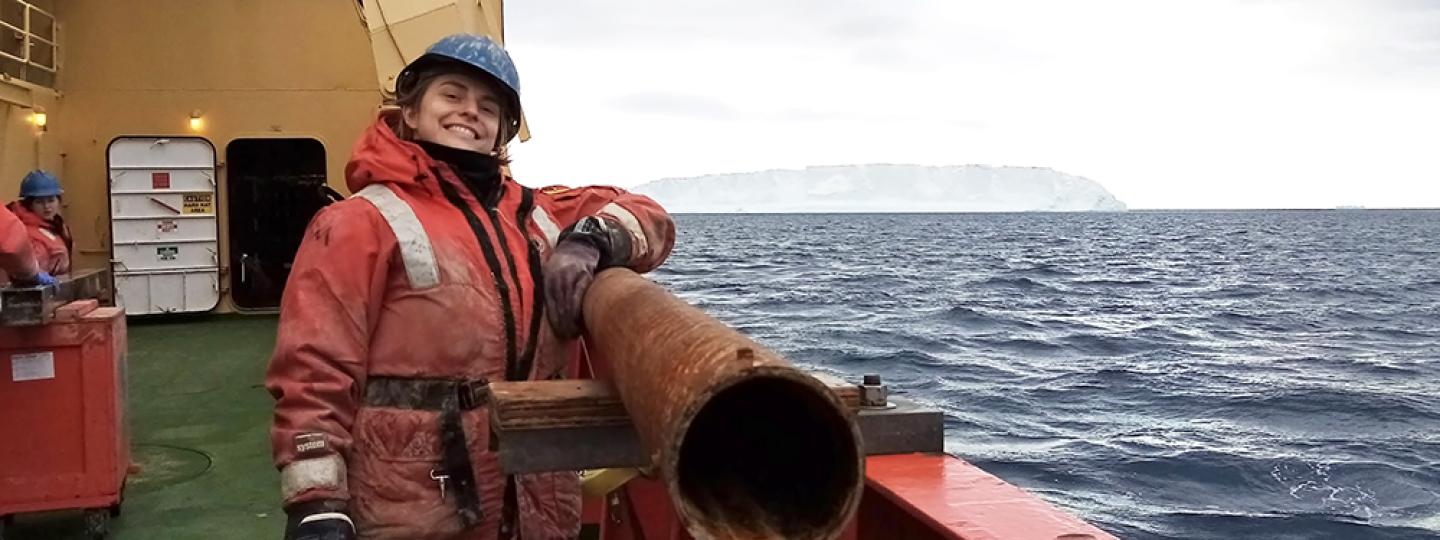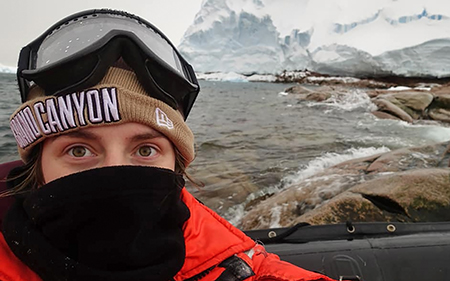Globetrotting alumna reaches destination thanks to curiosity and time

At negative 40 degrees, the Celsius and Fahrenheit scales line up.
Standing on the deck of a research boat in Antarctica, glaciers looming in the distance, Laura Taylor Barnett experienced this phenomenon herself. And beneath the balaclava shielding her nose and mouth, the San Jacinto College alumna was beaming.
In January 2020, two months before the pandemic shut down the world, Barnett boarded the Nathaniel B. Palmer in Chile and cruised to Antarctica for the Thwaites Glacier Offshore Research Project.
The undergraduate student traveled with a team of 26 geologists, geophysicists, and oceanographers who were collecting sediment cores, seismic and multibeam data, and water samples. Their goal? To understand what drove ancient and modern glacial retreat.
Just eight years earlier, Barnett would have pictured herself far from the southernmost continent. Back then, she was pursuing criminal justice at San Jac, hoping to become a correctional officer.
"I was young and wanted to change the world," she said. "Then I got disheartened by the correctional system."
While figuring out her new path, Barnett wound up in a physical geology class to fill her science credit. She had never clicked with science before, but the course content and her "young, hip" professor, Dr. Liana Boop, changed that. It was Barnett's "of course" moment.
"I had always asked a bunch of questions but didn't connect that curiosity to a research mindset," she said.
Barnett finished at San Jac as a physical science major and enrolled in the University of Houston's geology program, "the stepping stone that made the most sense."
While pursuing her bachelor's degree, she took three graduate-level classes from Julia Wellner, a professor who sidelined as chief scientist for expeditions to analyze the Thwaites Glacier. Dubbed the "Doomsday Glacier," Thwaites could raise sea level 2 feet worldwide when it melts.
After spying Barnett's interest in climate change, Wellner invited her to be an alternate for an upcoming trip. Two weeks before departure, Barnett was tapped to join the team.
"I was the alternate that got lucky," she said.
Before leaving on the research boat, Barnett and her teammates borrowed parkas, fleece, and boots at the U.S. Antarctic Program station in Chile. Her "hideous" orange-red jacket soon offered welcome protection from subzero temperatures.
Barnett's team not only collected sediment cores off glaciers but also discovered a newly exposed island. The predominantly female science team named this island Sif after the Greek goddess and wife of Thor.
Antarctica exceeded her wildest expectations.
"It was beautiful beyond words — spectacular," Barnett said. "The sun never set while we were there. It was kind of trippy. There were even seals and penguins that had never been exposed to humans. They're not scared of us and don't run away."
Beyond Antarctica, Barnett has studied the North American monsoon ancient record in Mexico, collected geophysical data of the Walvis Ridge offshore from Namibia, and investigated the Grand Canyon's age of formation.
In fact, counting layovers in Europe, Barnett has only Australia left to have stepped on every continent.
While some students earn their associate degrees alongside high school diplomas, Barnett took the opposite route — "not feeling a lot of pressure to graduate at a young age." She started at San Jac at 19, then completed her bachelor's at 28. Most semesters, she took fewer than 12 hours, focusing on exploring her interests and asking questions.
Now 29, the former undecided major is pursuing a doctorate in marine geology and geophysics at the Massachusetts Institute of Technology-Woods Hole Oceanographic Institute.
"I'm studying ancient hurricanes in the North Atlantic and the ancient oceanographic conditions that impacted their frequency — to better understand how future hurricanes will develop under rising sea-level and warming oceans," she said.
Boop, her former San Jac professor, isn't surprised.
"Only 5% of the oceans are explored, so I think this curiosity will serve Laura well in the field of marine geology," Boop said. "The wonderful thing about research is you can let your questions and curiosities guide you. You don't have to know exactly what you want to find. You just have to keep asking questions and answering them."
Time, it turns out, was the best gift Barnett could give herself.
"I never had the mindset 'I didn't graduate at 22. I'm a failure!'" she said. "My Ph.D. is so specific. I don't think I would have gotten there if I hadn't given myself time."

